The Capsule Hotels Market is estimated to be valued at USD 251.5 million in 2025 and is projected to reach USD 539.4 million by 2035, registering a compound annual growth rate (CAGR) of 7.9% over the forecast period.
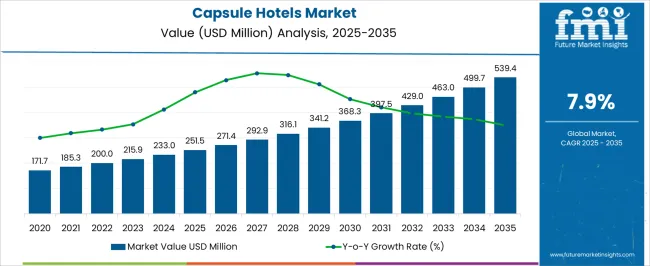
| Metric | Value |
|---|---|
| Capsule Hotels Market Estimated Value in (2025 E) | USD 251.5 million |
| Capsule Hotels Market Forecast Value in (2035 F) | USD 539.4 million |
| Forecast CAGR (2025 to 2035) | 7.9% |
The capsule hotels market is experiencing steady growth, driven by the increasing demand for affordable, flexible, and efficient accommodation solutions among urban and international travelers. Rising travel activity among millennials and young professionals, coupled with the growth of business and leisure travel, is shaping the market trajectory. The convenience and cost-effectiveness offered by capsule hotels are enhancing their appeal in densely populated cities and tourist hubs where space optimization is a priority.
Adoption is being further accelerated by digital platforms and online travel agencies that enable seamless booking, comparison, and payment processes. Integration of smart features such as app-based check-in, personalized lighting, and modular pod design enhances customer experience and operational efficiency.
Increasing awareness of capsule hotels as a viable alternative to traditional hotels and hostels is supporting their adoption across multiple travel segments As urbanization and mobility trends continue to evolve, the market is poised for sustained expansion, with opportunities for innovation in amenities, digital integration, and eco-friendly operations providing additional growth avenues in both domestic and international hospitality landscapes.
The capsule hotels market is segmented by traveler type, age group, booking mode, and geographic regions. By traveler type, capsule hotels market is divided into Solo and Group. In terms of age group, capsule hotels market is classified into 25-39 Years, 18-24 Years, 40-54 Years, and 55+ Years. Based on booking mode, capsule hotels market is segmented into Online and Offline. Regionally, the capsule hotels industry is classified into North America, Latin America, Western Europe, Eastern Europe, Balkan & Baltic Countries, Russia & Belarus, Central Asia, East Asia, South Asia & Pacific, and the Middle East & Africa.
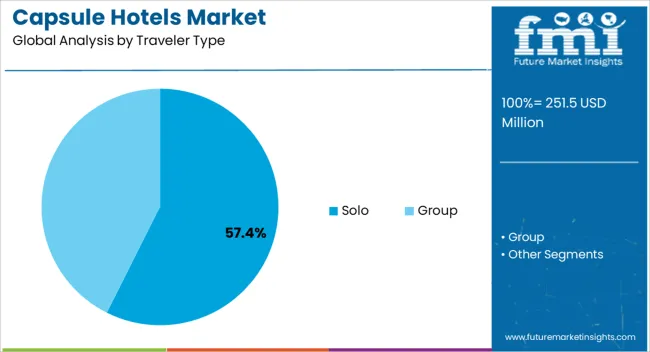
The solo traveler segment is projected to hold 57.4% of the capsule hotels market revenue share in 2025, establishing it as the leading traveler type. This dominance is being driven by the alignment of capsule hotel offerings with the preferences of individual travelers seeking privacy, affordability, and convenience. The compact, secure, and self-contained design of capsules allows solo travelers to enjoy a personalized stay without compromising on essential amenities.
Increasing participation in urban exploration, business trips, and short-term tourism among solo travelers is further reinforcing demand. Additionally, solo travelers are being drawn to the efficiency of check-in processes, smart room controls, and minimal staff interaction, which enhances comfort and safety.
The ability to combine cost-effectiveness with high accessibility in key urban and transit locations has made capsule hotels particularly attractive to this segment Growing awareness through travel blogs, social media, and digital travel platforms continues to support adoption, positioning solo travelers as the largest revenue-contributing segment in the market.
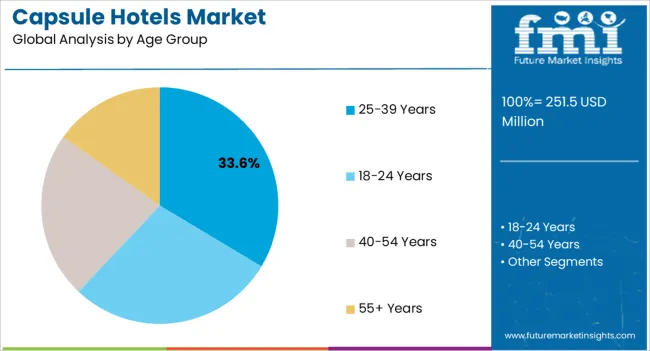
The 25-39 years age group is expected to account for 33.6% of the capsule hotels market revenue share in 2025, making it the leading age category. This age group is increasingly seeking affordable yet experiential travel options that combine convenience, digital integration, and social interaction. Capsule hotels are particularly aligned with the lifestyle preferences of this cohort, which values efficiency, modularity, and technology-enabled services.
The segment’s growth is being further accelerated by the rise in domestic and international travel among young professionals, early-career business travelers, and leisure tourists who prioritize short-term, cost-efficient accommodations. The appeal of compact, easily bookable rooms that maintain privacy while offering opportunities for community interaction resonates strongly with this demographic.
Marketing strategies that leverage social media, online travel platforms, and mobile apps are enhancing awareness and adoption within this age group The flexibility, affordability, and modern amenities of capsule hotels continue to reinforce the dominance of this age segment in overall market revenue share.
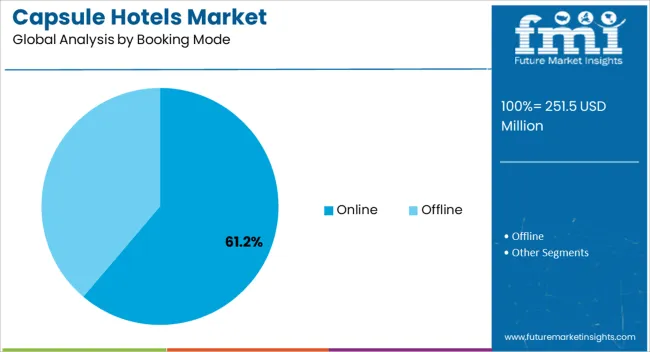
The online booking mode segment is projected to hold 61.2% of the capsule hotels market revenue share in 2025, positioning it as the leading booking channel. The prevalence of online bookings is being driven by the convenience, accessibility, and efficiency offered to both domestic and international travelers. Capsule hotels are increasingly integrated with online travel agencies, mobile applications, and direct booking platforms, enabling users to compare prices, select pods, and complete reservations quickly and securely.
The segment benefits from technological advancements in mobile platforms, real-time availability tracking, and instant confirmation systems that enhance the booking experience. The adoption of online booking is further reinforced by the growing digital literacy among travelers and the shift toward cashless, contactless transactions.
Increasing awareness and trust in online platforms have led to higher penetration, particularly among tech-savvy and younger travelers As digital adoption continues to expand and consumers increasingly seek frictionless travel experiences, online booking is expected to maintain its position as the dominant channel for capsule hotel reservations, driving significant revenue growth.
Japan is one of the most expensive countries in the world to live and work in. According to an Atlas and Boots study, the capital city Tokyo jumped six places from number 11 to number 5 in the 2025 ‘most expensive city for expatriates’ ranking.
Hotel room prices average around $250 per night in central Tokyo, which makes it a challenge for both companies and their employees to bear. Thanks to the ingenuity of Kisho Kurokawa, the first capsule hotel named Capsule Inn Osaka was opened in the city in 1979.
The main objective of capsule hotels is providing cheap accommodation for clients who do not need all the services offered by more conventional, star-rated hotels. The guest room is roughly pod or ‘capsule’ shaped and may include a TV, gaming console and Wi-Fi Internet connection.
Capsules are stacked side-by-side on two levels with steps providing access to the higher level. Privacy is provided with a curtain or fibreglass door, the washrooms are communal and there may be separate capsules for male and female guests. The capsule hotels sector varies in size from hotels with 50 capsules all the way up to hotels with 700 capsules.
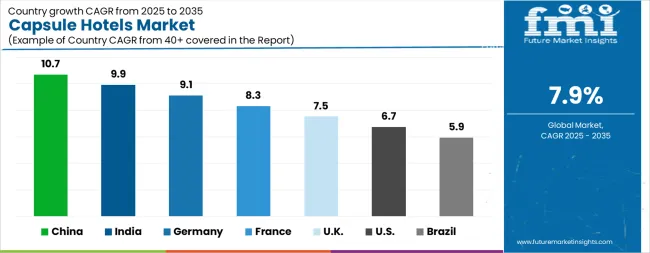
| Country | CAGR |
|---|---|
| China | 10.7% |
| India | 9.9% |
| Germany | 9.1% |
| France | 8.3% |
| UK | 7.5% |
| USA | 6.7% |
| Brazil | 5.9% |
The Capsule Hotels Market is expected to register a CAGR of 7.9% during the forecast period, exhibiting varied country level momentum. China leads with the highest CAGR of 10.7%, followed by India at 9.9%. Developed markets such as Germany, France, and the UK continue to expand steadily, while the USA is likely to grow at consistent rates. Brazil posts the lowest CAGR at 5.9%, yet still underscores a broadly positive trajectory for the global Capsule Hotels Market. In 2024, Germany held a dominant revenue in the Western Europe market and is expected to grow with a CAGR of 9.1%. The USA Capsule Hotels Market is estimated to be valued at USD 92.6 million in 2025 and is anticipated to reach a valuation of USD 177.9 million by 2035. Sales are projected to rise at a CAGR of 6.7% over the forecast period between 2025 and 2035. While Japan and South Korea markets are estimated to be valued at USD 12.2 million and USD 6.8 million respectively in 2025.
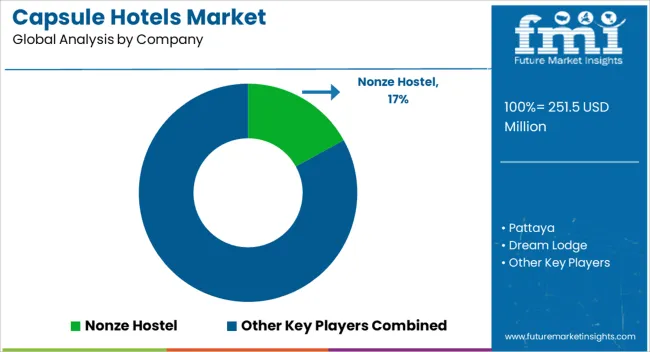
| Item | Value |
|---|---|
| Quantitative Units | USD 251.5 Million |
| Traveler Type | Solo and Group |
| Age Group | 25-39 Years, 18-24 Years, 40-54 Years, and 55+ Years |
| Booking Mode | Online and Offline |
| Regions Covered | North America, Europe, Asia-Pacific, Latin America, Middle East & Africa |
| Country Covered | United States, Canada, Germany, France, United Kingdom, China, Japan, India, Brazil, South Africa |
| Key Companies Profiled | Nonze Hostel, Pattaya, Dream Lodge, Lavender, Singapore, Inbox Capsule Hotel, Saint Petersburg, The Pod Sydney, Anshin Oyado, Bloc Hotels, Tubohotel, and Koyasan Guesthouse |
The global capsule hotels market is estimated to be valued at USD 251.5 million in 2025.
The market size for the capsule hotels market is projected to reach USD 539.4 million by 2035.
The capsule hotels market is expected to grow at a 7.9% CAGR between 2025 and 2035.
The key product types in capsule hotels market are solo and group.
In terms of age group, 25-39 years segment to command 33.6% share in the capsule hotels market in 2025.






Our Research Products

The "Full Research Suite" delivers actionable market intel, deep dives on markets or technologies, so clients act faster, cut risk, and unlock growth.

The Leaderboard benchmarks and ranks top vendors, classifying them as Established Leaders, Leading Challengers, or Disruptors & Challengers.

Locates where complements amplify value and substitutes erode it, forecasting net impact by horizon

We deliver granular, decision-grade intel: market sizing, 5-year forecasts, pricing, adoption, usage, revenue, and operational KPIs—plus competitor tracking, regulation, and value chains—across 60 countries broadly.

Spot the shifts before they hit your P&L. We track inflection points, adoption curves, pricing moves, and ecosystem plays to show where demand is heading, why it is changing, and what to do next across high-growth markets and disruptive tech

Real-time reads of user behavior. We track shifting priorities, perceptions of today’s and next-gen services, and provider experience, then pace how fast tech moves from trial to adoption, blending buyer, consumer, and channel inputs with social signals (#WhySwitch, #UX).

Partner with our analyst team to build a custom report designed around your business priorities. From analysing market trends to assessing competitors or crafting bespoke datasets, we tailor insights to your needs.
Supplier Intelligence
Discovery & Profiling
Capacity & Footprint
Performance & Risk
Compliance & Governance
Commercial Readiness
Who Supplies Whom
Scorecards & Shortlists
Playbooks & Docs
Category Intelligence
Definition & Scope
Demand & Use Cases
Cost Drivers
Market Structure
Supply Chain Map
Trade & Policy
Operating Norms
Deliverables
Buyer Intelligence
Account Basics
Spend & Scope
Procurement Model
Vendor Requirements
Terms & Policies
Entry Strategy
Pain Points & Triggers
Outputs
Pricing Analysis
Benchmarks
Trends
Should-Cost
Indexation
Landed Cost
Commercial Terms
Deliverables
Brand Analysis
Positioning & Value Prop
Share & Presence
Customer Evidence
Go-to-Market
Digital & Reputation
Compliance & Trust
KPIs & Gaps
Outputs
Full Research Suite comprises of:
Market outlook & trends analysis
Interviews & case studies
Strategic recommendations
Vendor profiles & capabilities analysis
5-year forecasts
8 regions and 60+ country-level data splits
Market segment data splits
12 months of continuous data updates
DELIVERED AS:
PDF EXCEL ONLINE
Capsule Vision Inspection Solution Market Size and Share Forecast Outlook 2025 to 2035
Capsule Filling Machines Market Size and Share Forecast Outlook 2025 to 2035
Capsule Endoscope and Workstations Market - Growth & Demand 2025 to 2035
Market Share Breakdown of Capsule Filling Machine Manufacturers
Capsule Coffee Machines Market
Wine Capsule Market Insights – Trends & Forecast 2024-2034
Resin Capsule Market Forecast and Outlook 2025 to 2035
Empty Capsule Market Report - Growth, Demand & Forecast 2025 to 2035
Market Positioning & Share in the Beach Hotels Industry
Beach Hotels Market Trends - Growth & Forecast 2025 to 2035
Pop-up Hotels Market Size and Share Forecast Outlook 2025 to 2035
Flavor Capsule Cigarette Market Analysis - Size, Share, and Forecast 2025 to 2035
Liquid Capsule Filling Machines Market Trends – Growth & Forecast 2025 to 2035
Coffee Capsules Market Analysis - Growth & Forecast 2025 to 2035
Coffee Capsules and Pods Market
Flavor Capsule Cigarettes Market
Washing Capsules Market Size and Share Forecast Outlook 2025 to 2035
Softgel Capsules Market Overview - Growth & Forecast 2025 to 2035
Market Share Distribution Among Floating Hotel Providers
Cryogenic Capsules Market Growth - Demand & Forecast 2025 to 2035

Thank you!
You will receive an email from our Business Development Manager. Please be sure to check your SPAM/JUNK folder too.
Chat With
MaRIA